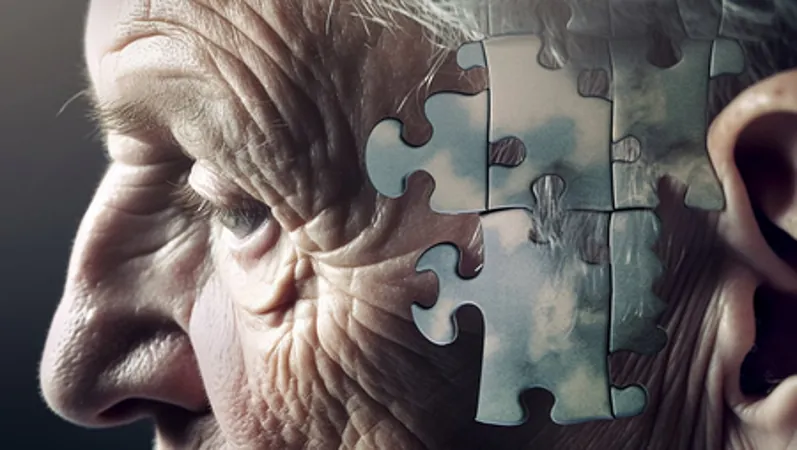
Breakthroughs in Alzheimer's: Hope Dawns with New Drugs and Game-Changing Blood Test
2025-09-22
Author: Nur
Alzheimer's Disease: A Growing Challenge
PARIS: After decades of disappointing progress, two innovative drugs and a groundbreaking blood test have recently ignited hope for Alzheimer's patients in their battle against this crippling disease. Yet, questions linger regarding their overall effectiveness.
Alzheimer's is a daunting challenge, accounting for around 70% of dementia cases globally and ranking as a leading cause of death among the elderly. As we approach Alzheimer’s Day this Sunday, here’s everything you need to know about these promising developments in diagnosis and treatment.
The New Drugs: Hope with Caution
Following years of research investment, the introduction of Eli Lilly's donanemab and Biogen and Eisai's lecanemab (branded as Leqembi) marks a significant milestone. These are the first drugs demonstrated to decelerate Alzheimer's progression.
However, their effectiveness is described as modest, claiming success primarily in patients at the disease's early stages. Moreover, potential side effects, such as severe brain hemorrhages, have sparked a heated debate over whether the advantages outweigh the risks. This has resulted in divergent stances from health regulators worldwide.
Though lecanemab has gained approval in several countries, including the United States, France recently declined to subsidize its cost due to insufficient evidence of benefits relative to its price. Similarly, the UK's health service echoed these concerns.
Revolutionizing Diagnosis with a Blood Test?
The landscape of Alzheimer's diagnosis is also shifting. Traditionally, a lumbar puncture was needed for diagnosis—an invasive procedure that discourages at-risk patients from seeking help. Now, a promising blood test, designed to detect biological markers associated with Alzheimer's, has emerged.
Authorized in the U.S. since May, the test awaits approval in Europe, where a national clinical trial is currently underway in Britain. However, skepticism remains about whether this test can independently confirm a diagnosis, as many patients with abnormal biomarkers may never develop dementia.
Most experts in Europe believe a comprehensive clinical examination will still be essential to validate cognitive decline, highlighting the ongoing debate regarding diagnostic practices.
Can We Prevent Alzheimer's?
Emerging consensus points to lifestyle factors dramatically influencing the risk of Alzheimer's. Nearly 50% of cases are associated with factors such as obesity, alcohol consumption, physical inactivity, and hearing loss. Consequently, research is ramping up to assess the efficacy of lifestyle improvement programs in tackling Alzheimer's.
Yet, targeted interventions have so far yielded limited results in terms of cognitive decline. A recent JAMA study did indicate that Alzheimer's patients exhibited a slight slowdown in cognitive deterioration after two years of intensive health support.
While the progress might seem minimal in the grand scheme, French epidemiologist Cecilia Samieri emphasized that today's advances signal a noteworthy leap from just a few years ago. She underscored the potential for longer-term trials—lasting 10 to 15 years—to provide deeper insights into effective preventive measures against this long-developing disease.
Looking Ahead: A New Era of Hope?
With these breakthroughs, the battle against Alzheimer's has entered a new phase. While challenges remain, the combination of novel treatments and potential diagnostic advancements may pave the way for a future where patients have a fighting chance against this relentless disease.




 Brasil (PT)
Brasil (PT)
 Canada (EN)
Canada (EN)
 Chile (ES)
Chile (ES)
 Česko (CS)
Česko (CS)
 대한민국 (KO)
대한민국 (KO)
 España (ES)
España (ES)
 France (FR)
France (FR)
 Hong Kong (EN)
Hong Kong (EN)
 Italia (IT)
Italia (IT)
 日本 (JA)
日本 (JA)
 Magyarország (HU)
Magyarország (HU)
 Norge (NO)
Norge (NO)
 Polska (PL)
Polska (PL)
 Schweiz (DE)
Schweiz (DE)
 Singapore (EN)
Singapore (EN)
 Sverige (SV)
Sverige (SV)
 Suomi (FI)
Suomi (FI)
 Türkiye (TR)
Türkiye (TR)
 الإمارات العربية المتحدة (AR)
الإمارات العربية المتحدة (AR)